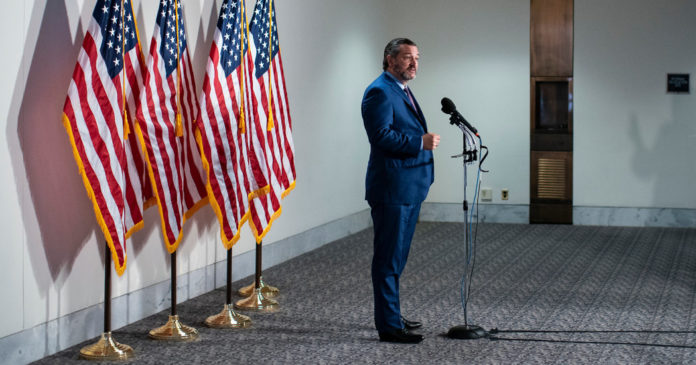BEIJING — As tensions between the two sides mount, the Chinese government announced on Monday that it would impose sanctions on three American lawmakers and a diplomat in retaliation for similar moves last week by the Trump administration against four officials in China.
The largely symbolic sanctions targeted Senator Marco Rubio of Florida, Senator Ted Cruz of Texas and Representative Chris Smith of New Jersey, all of whom are Republicans. Also named were Sam Brownback, President Trump’s ambassador at large for international religious freedom, and the Congressional-Executive Commission on China, a United States government agency that focuses on human rights.
The Trump administration imposed its sanctions in response to what it describes as pervasive human rights abuses in China’s Xinjiang region, home to the largely Muslim Uighur minority. The administration banned four Chinese officials and a Chinese government agency last Thursday from accessing American banks and other financial institutions. It also restricted them from obtaining visas to the United States.
Hua Chunying, the spokeswoman for the Ministry of Foreign Affairs, said on Monday that China had to react to American interference in its domestic affairs.
“We urge the U.S. side to immediately revoke the wrong decision and stop any words and deeds that interfere in China’s internal affairs and harm China’s interests,” Ms. Hua said at a news briefing. “China will make further response according to the development of the situation.”
Ms. Hua described the Chinese sanctions as “corresponding.” But she did not provide details on how they might prevent the targeted Americans from using China’s financial system or obtaining Chineses visas.
The sanctions are likely to be mostly symbolic on both sides, as neither the Chinese officials nor the Americans are known to have assets in each other’s financial systems.
Relations between the United States and China are increasingly strained. The administration has banned certain high-tech exports to Hong Kong in response to a newly imposed national security law in the territory, while President Trump has repeatedly blamed China for the coronavirus pandemic, an accusation Beijing resents.
The Trump administration took the latest action after weeks of heavy pressure from Congress, including an overwhelming, bipartisan vote by the House in May in favor of penalties against senior Chinese officials in Xinjiang.
The United States applied sanctions to Chen Quanguo — a member of China’s 25-member ruling Politburo and party secretary of the Xinjiang region. The administration also penalized Zhu Hailun, a former deputy party secretary for the region; Wang Mingshan, director of the Xinjiang Public Security Bureau; and Huo Liujun, a former party secretary of the bureau. The bureau itself was also included in the sanctions.
Secretary of State Mike Pompeo said last Thursday that the American sanctions were in response to “forced labor, arbitrary mass detention, and forced population control, and attempts to erase their culture and Muslim faith.”
Chinese security forces have rounded up as many as a million mostly Muslim members of ethnic minorities in barbed-wire camps and prisons for extensive indoctrination, among other human rights abuses. The Chinese government began its crackdown several years ago after a series of attacks on civilians that Beijing attributed to Uighur extremists.
Ms. Hua said on Monday that the Chinese government was “unswervingly determined to combat violent and terrorist forces, separatist forces and religious extremist forces.”
Claire Fu contributed research.
Source : Nytimes














